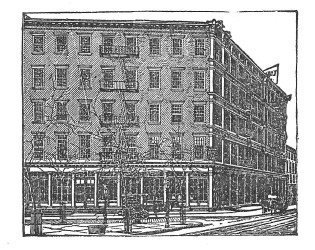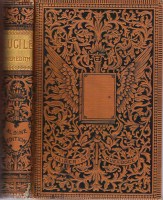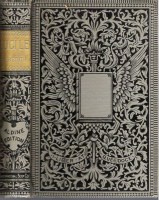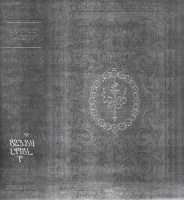PUBLISHER: United States Book Company, New York and Chicago, 1895-1902
ABOUT: Organized in 1890 by John W. Lovell as a gigantic book trust. It bought up cheap reprint libraries.... In 1890 the company was incorporated in New Jersey with [3.25] million dollars.... Several satellite companies were established to distribute the books. They included: Lovell, Coryell & Company; Wayside Publishing Company; Seaside Publishing Company, the National Book Company; the International Book Company; Empire Publishing Company; the Lovell Brothers & Company; Prudential Book Company; and Lovell, Gestefeld & Company. / Within three years the bubble burst, bringing to an end the career of the flamboyant Lovell. The firm was succeeded by the American Publishers Corporation, which maintained a precarious existence until 1904. (Kurian).

"The United States Book Company was incorporated in July 1890, in New Jersey, with a capitalization of $3,250,000 in preferred and common stock, and an added issue of stocks and bonds that brought the total indebtedness to $5,000,000. To give the venture 'tone,' as the newspapers called it, one of the incorporators was the well-known millionaire financier, H. K. Thurber, along with a variety of companies. The history of this firm was brief but exciting. Lovell began by flooding the country with the widest range of "series" the publishing business had ever seen. Promising salesmen were trained intensively to sell thse volumes to retailers,among them John Hovenden , regarded as the dean of American book salesmen. / In spire of these intensive efforts, it was clear before long that the market did not want to be cornered, New editions were constantly appearing, and it was rumored that some of the 'trust's' own stockholders were secretly trying to buck it, although this was never proved. Instead of paying a 12 percent dividend in two years, as had been expected and promised, an assessment had to be made on the stockholders -- paradoxically, because the company was growing so fast that it was outracing its capital. New capital had to be found, the assessment being insufficient, so a mortgage loan of $1,000,000 was arranged from the Manhatten Trust Company -- one of the largest personal mortgages on record up to that time. / In funds again, Lovell began to spin off a growing number of satellite subsidiaries -- Lovell, Coryell & Co. , turning out quality books in cloth or leather; the Wayside Publishing Company; the Seaside Publishing Company; and the National Book Company, whose president was another Lovell brother, Edward. There was the International Book Company , the Empire Publishing Company, with Frank Lovell in charge; and Lovell Bros. & Co. , in which several of the clan were involved. Obviously, the Lovell brothers were milking every part of the book business on which they could lay their entrepreneurial hands, in a bewildering complex of interlocking companies that took up page after page of advertising in an issue of the American Bookseller occupied entirely by the disply of Lovell wares. / John Lovell had his own subsidiary, and of course it was the most interesting. Lovell, Gestefeld & Co. ...." (Tebbel BC, page 150).
PERSONAL NOTES. Mr. B. M Coryell, formerly with the Western News Company and recently with Belford, Clarke & Co., has just assumed the charge of the selling department of the United States Book Company. [Publishers' Weekly 987 12-27-1890 p1037].
The story of the pirated editions of James M. Barrie is closely associated with the story of the United States Book Co., a huge organization that combined legitimate and pirate publishing with equal aplomb. It was not in the class of Ogilvie, Optimus, Ivers, Allison or Lupton, firms for which piracy was primary. These firms pirated both the legitimate and pirate publications of the United States Book Co. … The company was initially formed in July of 1890 as a reorganization of the John W. Lovell Company, and for the first year their imprint bore the legend, “Successors to John W. Lovell Company.” While the company acquired twenty-two imprints, only a few were used. Primarily used were the Seaside Publishing Company (which included Seaside Library and Munro’s Library), National Publishing Company, International Publishing Company, Empire Publishing Company, New York Publishing Company and Hovendon Company imprints, all located at 43, 45 and 47 East 10th Street. In 1891, the Lovell, Coryell Company imprint was added. The firm declared bankruptcy and, in March of 1893 was placed in the hands of Receiver Charles Gould, who moved the company to 5 and 7 East 16th Street in May, 1893. … Meanwhile John Lovell formed a separate company, the Lovell Book Company at 52 Duane Street, and Frank Lovell established the Home Book Company at 142 Worth Street…
In 1896, the United States Book Company was reorganized as the American Publisher’s Corporation, dropping all imprints but Lovell, Coryell (which was dropped in 1897) and moving to 310-318 Sixth Avenue. … In 1898, the company folded entirely, succeeded by a plate renting business for a few months. While two young employees of the company, Alexander Grosset and George T. Dunlap, fell heir to many of the printing plates, using them to found the great American reprint house that bears their name, it was another American reprinter, A. L. Burt, that ended up with the [James M.] Barrie plates. –This summary history of the United States Book Co and derivative companies is excerpted from a longer piece by Christopher Coppola on a PAH [Project Accessible Hollywood] Nation page at http://www.pahnation.com/the-pirated-editions-of-james-m-barrie/. Note, however, Coppola is quoting, near verbatim, from Bradley Dwayne Cutler, Sir James Barrie: A bibliography, Greenberg, 1931, p9].
AFFAIRS OF THE TROW COMPANY. --The treasurer of the Trow Cornpany prior to 1892 was Edward Lange, and he was also treasurer of the [United States] Book Company. The directors passed a resolution giving the United States Book Company credit up to $100,000, and Lange, without authority, extended it up to $165,000. The Trow Company’s directors then fixed the limit at $165,000, and ordered that no more credit should be given, but Lange permitted the Book Company to pile up its indebtedness until it reached $200,000. It was then that the crash came. The directors of the Trow Company removed Lange. Then the Book Company failed to meet its notes and went into the hands of a receiver. This embarrassed the Trow Company and was the cause of all the trouble. It is alleged that Lange has fomented the present opposition to the company, and that he is backed by W. C. Taylor, Philip Hathaway, and a few other stockholders. [Publishers' Weekly 46:1173, November 3, 1894, p121-122]
A CIRCULAR. notifying the bondholders of the United States Book Company to take part in a plan of reorganization has been issued by Messrs. John H. Davis & Co., 10 Wall Street. New York, the brokers who originally participated in the formation of the United States Book Company, the Trow Company, and kindred organizations, and who marketed part of their securities. It is proposed that the bondholders should pay an assessment of seven per cent. ($70 per bond), which, on the entire million, would give &70,000 as a working fund; and that they should then receive five per cent. bonds of a new corporation to be organized to take over the plates and continue the publishing business. The bondholders are invited to give the usual power of attorney to a committee consisting of Messrs. John Kean, Jr., George M. Hard, and Jennings S. Cox, who will select a suitable person to carry on the new business or make other arrangements for its continuance. Just what would be the market value of the new bonds, on a book business under present conditions of trade, burdened with a first payment of $50,000 per year, and just what the unfortunate stockholders of the United States Book Company would get after foreclosure of the bonds, are both difficult problems. [Publishers' Weekly 46:1188, November 3, 1894, p146.]
LUCILE’s ISSUED BY United States Book Company :
1890 Supplement PTLA: Publications of the United States Book Company successors to
1892 PTLA: 5 & 7 East 16th Street, NYC and 266 & 268 Wabash Avenue, Chicago. Lucile is listed in: The Home Library. Comprising volumes of Standard Works, embracing fiction, essays, poetry, history, etc., etc., selected from the world's best literature, written by authors of world-wide reputation. Printed from large type on good paper, and bound in handsome cloth binding. Retail price, 75 cents.
Reported copies:



Last revised: 4 February 2024